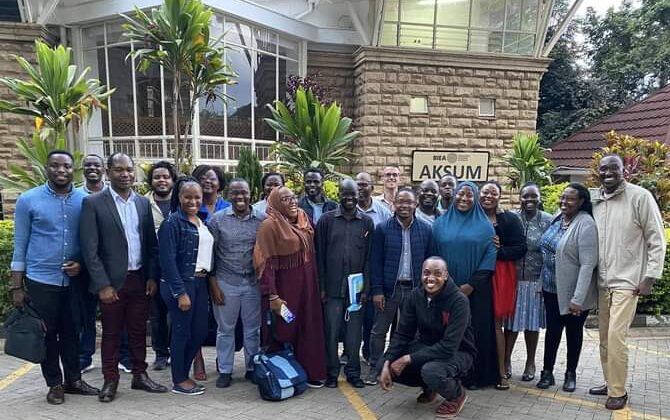African Ecologies: Reflections from a workshop

Late July 2023, fifteen early-career researchers from various parts of Africa gathered in Nairobi. They participated in the “African Ecologies” writing and mentoring workshop. This workshop took place at the British Institute in Eastern Africa (BIEA) and was co-hosted by the Leeds University Centre for African Studies, with funding from the British Academy.
The workshop was organised by Professor Adriaan van Klinken (Leeds) with Dr Abel Ugba (Leeds) and Dr Damaris Parsitau (BIEA), with Dr Simon Manda (Leeds) and Dr Tom Odhiambo (Nairobi) as co-facilitators.
Participants for the workshop had been selected via an open call for proposals. Fifteen early-career scholars – ranging from postgraduate students to postdoctoral fellows and lecturers – were selected, from across the continent, with Kenya and Nigeria being particularly well-represented, alongside scholars from Cameroon, Ghana, Malawi, Zimbabwe. They represented a wide range of disciplines across the Arts, Humanities and Social Sciences, which in itself made for a learning experience:
The unique perspectives of scholars coming from literature studies, religion, theology, media studies and visual art, among others, invited humility as we all realized there is much to learn from each other, and certainly, from every discipline across the arts, humanities and social sciences. (Kevin Muriithi Ndereba)
The workshop programme consisted of two tracks. In the first one, participants presented their prepared papers based on their own research. In each session, the papers received feedback from two fellow participants and one of the facilitators, before opening up the discussion for all participants. This in itself was a training in offering, and receiving, critical but constructive feedback:
The positive criticism and remarks during my presentation have not only helped me to develop an interesting paper but played a great role in building my self-confidence which has been a challenge to me. (Noela Banla Kinyuy)
The mutual peer review constructive criticism was a game changer. It has pushed me to step outside my comfort zone and embrace feedback from my peers. Learning how to give and receive constructive criticism empowered me to grow personally and professionally. (Isabella Omutiko Mulanda)
Each of the papers broadly related to the overall theme of “African Ecologies”, exploring topics such as indigenous ecological knowledges; eco-criticism in African literature; eco-spirituality in African indigenous religions and Christianity; faith-based organisations and their response to climate change; and media reporting about environmental issues. As a foundation for the workshop, we read and discussed some key texts on African ecologies. Participant summarised the insights gained as follows:
I now have a deep understanding of the intricate ecosystems in Africa and the importance of conservation effort. This experience inspired me to take action and be more involved in environmental preservation. (Isabella Omutiko Mulama)
We were allowed the freedom to task our creative-imaginative abilities while engaging the broad theme of African Ecology. This made it easy for us to learn first hand the diversity of the African ecological landscape. (Emmanuel Edafe Erhijodo)
The workshop equally facilitated my understanding of the contribution of African knowledge in solving ecologically challenges and how science could benefit from this in bringing solutions. (Noela Banla Kinyuy)
The second track was a series of sessions about academic skills, such as interdisciplinarity, peer reviewing, journal publishing, and research funding:
From being introduced to the art of peer review and criticism, down to the trainings on multidisciplinary, interdisciplinary and transdisciplinary research, the lessons continue to resonate in my memory and have left a lasting impact on my career path. (Ibukunolu Isaac Olodude)
Some of the lessons learnt in these sessions were truly eye-opening, such as about positionality:
A crucial term I grasped was "positionality" in applying methodology. I understood that one's motives and curiosities shape the choice of research and its execution. Contextualising research is essential for readers to better relate to the paper. By the end of the session, we were addressing each other by our research topics, highlighting the significance of positionality in our discussions. (Carine Amo-Nyampong)
The three-day workshop made for a very full programme. Nevertheless, we found time to socialise and talk informally, during breaks and over dinner. The garden of the BIEA offered a lovely space for this, and so did the restaurant where we had the closing workshop dinner.
To the shock of the participants from West Africa in particular, it was quite chilly in Nairobi. However, as one of them put it, “the warmth of the cohort – conveners, participants, and BIEA staff – bound us together” (Carine Amo-Nyampong).
The objective of the workshop was to support participants in developing their writing skills, help them prepare their work for publication, build their research profile, and strengthen their networks. Going from the feedback, this objective was well achieved:
“The workshop created a very supportive and nurturing environment that I had not encountered in the past, which clearly painted the message that constructive criticism is not about tearing up but helping each other reach new heights in our writing journey.” (Isabella Omutiko Mulama)
“I have personally learnt from the facilitators what it takes to be a successful researcher. Their simplicity and humility and their willingness to mentor early career researchers and young scholars is worthy of note. I look forward to receiving continued mentorship from them, and I hope someday to become a mentor in the emerging field of African Ecolinguistics myself.” (Ibukunolu Isaac Olodude)
Following the workshop, participants also attended the biannual conference of the African Association for the Study of Religions, also in Nairobi. Here, they had an opportunity to present their revised papers in three thematic panels on religion, culture and ecology, having benefited from the workshop feedback. For several participants, it was their first-ever presentation at an international conference. This was a ‘bonus’ which allowed them to ‘further develop critical presentation and public speaking skills, which are central for any academic’ (Kevin Muriithi Ndereba).
The workshop organisers are currently developing a publication plan for the papers presented at the workshop. Watch this space for further announcements!
